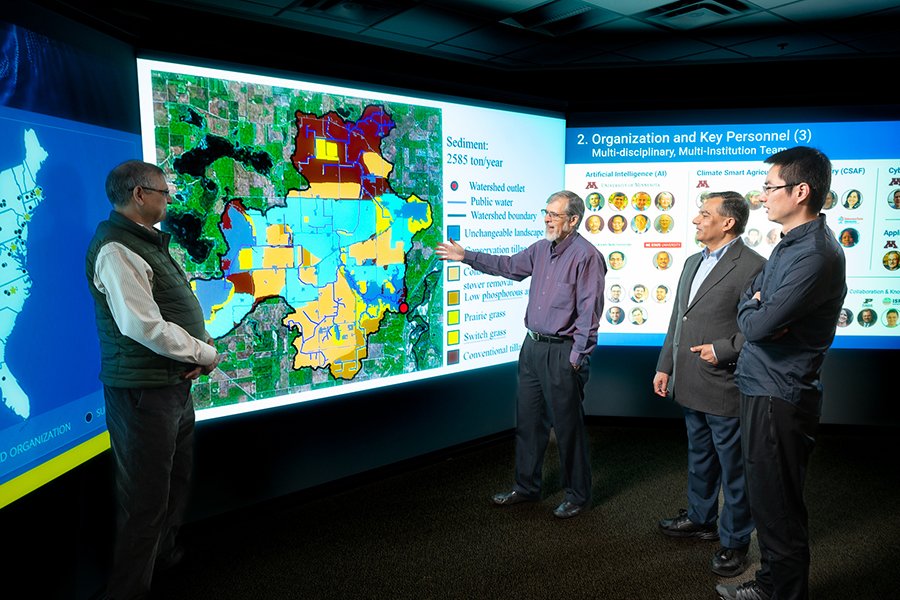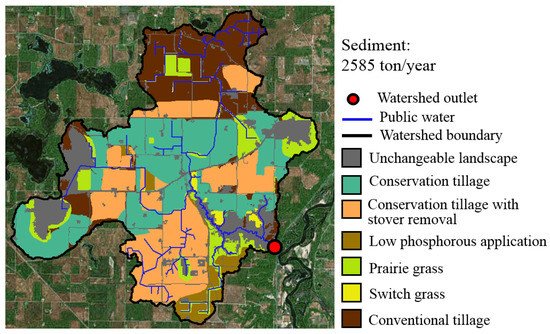CS&E Professor Shashi Shekhar to Lead New $20M AI Institute

Department of Computer Science & Engineering Professor Shashi Shekhar will direct a new National Artificial Intelligence Research Institute led by the University of Minnesota. Awarded by the National Science Foundation (NSF) and U.S. Department of Agriculture’s (USDA) National Institute of Food and Agriculture (NIFA), this five-year, $20 million grant will fund the AI Institute for Climate-Land Interactions, Mitigation, Adaptation, Tradeoffs and Economy (AI-CLIMATE).
In a joint effort between the University of Minnesota Twin Cities College of Science and Engineering (CSE), Minnesota Robotics Institute, CSE Data Science Initiative, College of Food, Agriculture, and Natural Resource Sciences, and the Office of the Vice President for Research, the AI-CLIMATE will advance artificial intelligence (AI) in many areas, including spatial-variability-aware knowledge-guided machine learning, and AI-aided multi-objective optimization. It will leverage these novel AI methods to revolutionize the agriculture and forestry industries, prioritizing climate-smart practices that will sequester carbon and boost their respective economies.
Carbon is a key part of climate-smart agriculture and forestry and it is important to measure it accurately in a cost-effective manner. Farms and forests have the natural ability to pull more carbon dioxide out of the atmosphere than they release, creating a “carbon sink.” While there are ways to incentivize farmers and foresters for utilizing this carbon-saving tactic, the current technology is expensive and makes it difficult to accurately measure how much carbon has been pooled.
The AI-CLIMATE institute will work to improve the accuracy and reduce the cost of this practice through AI-enabled models, and deliver those to land stewards via decision-support tools such as collaborative-geodesign and spatial-optimization as illustrated in the figure below.

“When farmers touch, smell, and look at the soil, they can tell if it’s carbon rich or not,” Shekhar said. “We are developing easy-to-use tools that can measure and estimate carbon sequestration across millions of acres of farms and forests saving farmers and foresters time, energy, and money. This will be accomplished by novel AI methods such as spatial-variability- and physics- aware deep neural networks and AI-aided multi-objective optimization algorithms."
In addition to Shekhar, Department of Computer Science & Engineering faculty members Vipin Kumar, Nikolaos Papanikolopoulos, Maria Gini, Yao-Yi Chiang and Ju Sun are key leaders in the new institute. Professor Kumar will co-lead the foundational AI thrust, including the knowledge-guided machine learning theme, which will also involve associate professor Chiang and assistant professor Sun. Professor Papanikolopoulos will co-lead the collaboration nexus thrust, and professor Gini will co-lead the broadening participation thrust.
The Institute will bring together researchers and educators from across the University and from partner institutions including Cornell University, Colorado State University, Delaware State University, Purdue University, and North Carolina State University. The researchers will also collaborate with the American Indian Higher Education Consortium (AIHEC) and the tribal nations it represents.
AI-CLIMATE builds on the extensive and long-running collaborations between CS&E AI researchers, and agriculture and forestry experts from the University of Minnesota’s College of Food, Agriculture and Natural Resource Sciences, including professors David Mulla, Zhenong Jin, and Phil Pardey. The proposal submission and preparation was supported by the Minnesota Robotics Institute and CSE Data Science Initiative.
AI-CLIMATE is one of seven new NSF- and NIFA-funded AI institutes, and is part of a nearly $500 million dollar initiative to prioritize collaborative AI research across the country. It is also complementary to over $3 billion investments in climate-smart commodities by the U.S. Department of Agriculture.
Read the University of Minnesota and College of Science and Engineering's announcement and learn more about all the new AI Research Institutes on the NSF website.